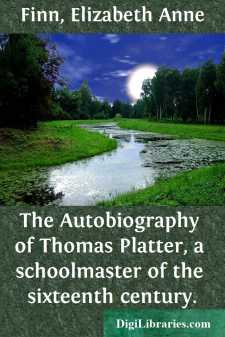Categories
- Antiques & Collectibles 13
- Architecture 36
- Art 48
- Bibles 22
- Biography & Autobiography 813
- Body, Mind & Spirit 142
- Business & Economics 28
- Children's Books 17
- Children's Fiction 14
- Computers 4
- Cooking 94
- Crafts & Hobbies 4
- Drama 346
- Education 46
- Family & Relationships 57
- Fiction 11829
- Games 19
- Gardening 17
- Health & Fitness 34
- History 1377
- House & Home 1
- Humor 147
- Juvenile Fiction 1873
- Juvenile Nonfiction 202
- Language Arts & Disciplines 88
- Law 16
- Literary Collections 686
- Literary Criticism 179
- Mathematics 13
- Medical 41
- Music 40
- Nature 179
- Non-Classifiable 1768
- Performing Arts 7
- Periodicals 1453
- Philosophy 64
- Photography 2
- Poetry 896
- Political Science 203
- Psychology 42
- Reference 154
- Religion 513
- Science 126
- Self-Help 84
- Social Science 81
- Sports & Recreation 34
- Study Aids 3
- Technology & Engineering 59
- Transportation 23
- Travel 463
- True Crime 29
The Autobiography of Thomas Platter, a schoolmaster of the sixteenth century.
Description:
Excerpt
CHAPTER I.
MASTER THOMAS BECOMES A GOATHERD.
I came into this world on the Shrove-Tuesday of the year 1499, just as they were coming together for mass. From this circumstance, my friends derived the confident hope that I should become a priest, for at that time that sort of superstition was still every where prevalent. I had one sister, named Christina; she alone was with my mother when I was born, and she afterwards told it me. My father's name was Anthony Platter, of the old family of Platter, who have their name from a house which stands on a broad plat (Platte). This plat is a rock on a very high mountain, near a village of the name of Grenchen, in the district and parish of Visp, a considerable village of the Canton of St. Gall. My mother, however, was named Anteli Summermatter, of the very great family of that name. Her father attained the age of 126. I conversed with him six years before his death; and then he told me that he knew ten more men in the parish of Visp who were all older than he. When he was 100 years old he married a woman who bore him one son. By his first wife he left sons and daughters, of whom some were white-headed and some grey before he died. They called him old Hans Summermatter. The house in which I was born is near the village of Grenchen, and is called Am Graben. My mother could not nurse me herself, therefore I was obliged to drink cow's milk through a small horn, as is the custom in that country when they wean a child: because they give the children nothing to eat, but only milk to drink, till they are four or five years old. My father died when I was so young that I do not remember ever to have seen him. It is usual in that country for almost all women to be able to weave and sew. Before the winter, almost all the men go into the territory of Berne to buy wool: this the women spin, and make rustic cloth of it for coats and trowsers for the peasants. So also my father was in the district of Thun, in the territory of Berne, buying wool. There he was attacked by the plague and died, and was buried at Staffisburg, a village near Thun. Soon after, my mother married a man of the name of Heintzmann, who lived in a house between Stalden and Visp, that was called Am Grunde. So the children were all separated from her: I do not exactly know how many of them there were. Of my sisters, I knew only two;--one, whose name was Elizabeth, died in Entlibuch, where she was married;--the name of the other was Christina, and she died above Stalden, at Burgen, of the plague, with eight persons of her family. Of my brothers, I knew three: the first was called Simeon, the other Hans, the third Theodore. Simeon and Hans fell in battle. Theodore died at Oberhofen, on the lake of Thun: for the usurers had mined my father, so that my brothers were obliged to go to service almost as soon as they could do any thing; and as I was the youngest, some of my aunts, my father's sisters, had me with them for a while. I can still well remember that I was with one whose name was Margaret....


